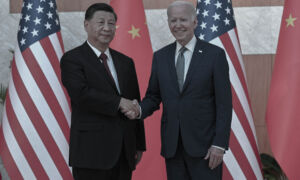Does China Only Have 10 Years Left Before It Implodes?
Commentary During a recent interview with Joe Rogan, the geopolitical analyst Peter Zeihan made a rather stunning comment. China, he said, only has 10 years left. A decade left to do what, exactly? In short, disappear. Due to the country’s ticking demographic time bomb, the ballooning property bubble, anti-lockdown protests, and high unemployment rates among Chinese youth, the Chinese Communist Party (CCP) can kiss its dreams of global domination goodbye. Or so Zeihan believes. However, one can’t help but feel that Zeihan is, shall we say, a little too optimistic. He’s not necessarily wrong. But the idea that China will be of little threat by 2033 seems a little too optimistic. As Pew Research Center recently noted, China’s population will decline from its current population of 1.4 billion to 1.313 billion by 2050. By 2100, that number will fall to 800 million. China’s demographic decline is indisputable. However, as history has shown us, premature jocularity is routinely punished in the cruelest of manners. The year 2100 is a long time away. China still has a few decades left in the disruptive tank. Moreover, during an interview with Chris Williamson that aired in January, the data scientist Stephen J. Shaw delivered a number of cold, hard truths. When it comes to demographic decline, he said, we are all on the same rollercoaster. Yes, countries like China, Japan, and South Korea are at the front of this terrifying ride, but Italy, Germany, and the United States are just a few “seats” behind. We are all headed in the same direction, some faster than others. In the present, as the recent spy balloon episode demonstrated, China is still a major force to be reckoned with, and there’s very little, if any, reason to think that its power will diminish within the next decade. Some commentators have suggested that China’s economy, in the red for most of 2021 and 2022, is on the up again. China’s economic growth is synonymous with its scientific progress. As I write this, there is a seismic shift occurring in the world of scientific research. The United States, once the dominant force, is being replaced by China. The ramifications of this transfer of knowledge could prove to be severe. Changing of the Guard In a recent piece for Asia Times, Caroline Wagner, an international relations expert at the Ohio State University, discussed the rise of China as a scientific powerhouse. Her research shows that Chinese scholars now publish the majority of the top 1 percent of most cited scientific papers. Contrary to popular belief, citations do matter. The most highly-cited research represents the most influential scientific findings. As Wagner noted, the recent shift in scientific supremacy has left a number of U.S. policy experts feeling more than a little worried. If trends continue, considering China has a far larger population of scientists and produces far more STEM doctorates than the United States, it’s only a matter of time until the United States is left in the scientific dust. This matters for a number of reasons, largely because scientific knowledge and aptitude are inextricably linked to both economic growth and military capabilities. The wars of tomorrow won’t be won by the countries with the fanciest missiles; they’ll be won by the countries with the sharpest scientific minds—the best artificial intelligence specialists, the most quantum computists, and hacking whizkids. China has all three in abundance. China has already pulled ahead of the United States in the quantum race; it’s also outperforming the United States in AI-related research. To compound matters, in November last year, a top general with the Space Force admitted that China’s military technology could soon become more advanced than U.S. technology. A People’s Liberation Army (PLA) Air Force WZ-7 high-altitude reconnaissance drone is seen a day before the 13th China International Aviation and Aerospace Exhibition in Zhuhai, in southern China’s Guangdong Province, on Sept. 27, 2021. (Noel Celis/AFP via Getty Images) What, if anything, can be done to stem (or STEM) the tide? What can the United States do to remain scientifically competitive with China? Wagner believes the United States should stop decoupling efforts and instead seek to collaborate with the Chinese regime, a country that has stolen trillions in intellectual property, most of it from the United States; a country that has stolen the personal data of 80 percent of the U.S. population; a country that poses the most significant threat to the United States. Wagner believes that the policy responses from the current administration are “rooted in a nationalistic view that doesn’t wholly map onto the global endeavor of science.” That’s because academic research is a collaborative affair driven by the exchange of ideas and information. For the United States to “benefit from China’s scientific rise,” cooperation is necessary. However, Chinese scientists have a history of acting as a

Commentary
During a recent interview with Joe Rogan, the geopolitical analyst Peter Zeihan made a rather stunning comment. China, he said, only has 10 years left. A decade left to do what, exactly? In short, disappear.
Due to the country’s ticking demographic time bomb, the ballooning property bubble, anti-lockdown protests, and high unemployment rates among Chinese youth, the Chinese Communist Party (CCP) can kiss its dreams of global domination goodbye. Or so Zeihan believes.
However, one can’t help but feel that Zeihan is, shall we say, a little too optimistic. He’s not necessarily wrong. But the idea that China will be of little threat by 2033 seems a little too optimistic. As Pew Research Center recently noted, China’s population will decline from its current population of 1.4 billion to 1.313 billion by 2050. By 2100, that number will fall to 800 million. China’s demographic decline is indisputable. However, as history has shown us, premature jocularity is routinely punished in the cruelest of manners. The year 2100 is a long time away. China still has a few decades left in the disruptive tank.
Moreover, during an interview with Chris Williamson that aired in January, the data scientist Stephen J. Shaw delivered a number of cold, hard truths. When it comes to demographic decline, he said, we are all on the same rollercoaster. Yes, countries like China, Japan, and South Korea are at the front of this terrifying ride, but Italy, Germany, and the United States are just a few “seats” behind. We are all headed in the same direction, some faster than others.
In the present, as the recent spy balloon episode demonstrated, China is still a major force to be reckoned with, and there’s very little, if any, reason to think that its power will diminish within the next decade. Some commentators have suggested that China’s economy, in the red for most of 2021 and 2022, is on the up again. China’s economic growth is synonymous with its scientific progress. As I write this, there is a seismic shift occurring in the world of scientific research. The United States, once the dominant force, is being replaced by China. The ramifications of this transfer of knowledge could prove to be severe.
Changing of the Guard
In a recent piece for Asia Times, Caroline Wagner, an international relations expert at the Ohio State University, discussed the rise of China as a scientific powerhouse. Her research shows that Chinese scholars now publish the majority of the top 1 percent of most cited scientific papers. Contrary to popular belief, citations do matter. The most highly-cited research represents the most influential scientific findings.
As Wagner noted, the recent shift in scientific supremacy has left a number of U.S. policy experts feeling more than a little worried. If trends continue, considering China has a far larger population of scientists and produces far more STEM doctorates than the United States, it’s only a matter of time until the United States is left in the scientific dust.
This matters for a number of reasons, largely because scientific knowledge and aptitude are inextricably linked to both economic growth and military capabilities. The wars of tomorrow won’t be won by the countries with the fanciest missiles; they’ll be won by the countries with the sharpest scientific minds—the best artificial intelligence specialists, the most quantum computists, and hacking whizkids. China has all three in abundance. China has already pulled ahead of the United States in the quantum race; it’s also outperforming the United States in AI-related research. To compound matters, in November last year, a top general with the Space Force admitted that China’s military technology could soon become more advanced than U.S. technology.

What, if anything, can be done to stem (or STEM) the tide? What can the United States do to remain scientifically competitive with China? Wagner believes the United States should stop decoupling efforts and instead seek to collaborate with the Chinese regime, a country that has stolen trillions in intellectual property, most of it from the United States; a country that has stolen the personal data of 80 percent of the U.S. population; a country that poses the most significant threat to the United States.
Wagner believes that the policy responses from the current administration are “rooted in a nationalistic view that doesn’t wholly map onto the global endeavor of science.” That’s because academic research is a collaborative affair driven by the exchange of ideas and information. For the United States to “benefit from China’s scientific rise,” cooperation is necessary.
However, Chinese scientists have a history of acting as agents for the CCP. The CCP, we’re told, is literally in the business of stealing science. Of course, this is not to say that all Chinese scientists are working for Beijing. That’s simply not the case. However, to think that a large-scale, collaborative effort between the United States and China is either attainable or realistic is the stuff of dangerous delusions. Beneficial collaborations are built on trust. How is the United States ever to trust communist China again? It can’t. It shouldn’t (the old fable of “The Scorpion and the Frog” comes to mind).
No, to compete with China on the scientific stage, a much better plan is needed. This plan must be devised by those in power, and it must be devised immediately. STEM education must be improved in U.S. schools. Math, we’re told, is racist. It’s not, but it’s necessary for scientific progress. That’s bad news for the United States. An increasing number of students are struggling with basic math (as well as basic English comprehension). This must change. In schools, curricula must be revamped.
With all this talk of China only having 10 years left, what if, instead, it’s the United States that only has 10 years left? After all, nationwide, the number of undergraduates entering university continues to fall. What if, within the next decade, China makes so much scientific progress that the United States finds itself playing an exhausting, utterly futile game of catch-up for years to come?
Views expressed in this article are the opinions of the author and do not necessarily reflect the views of The Epoch Times.












